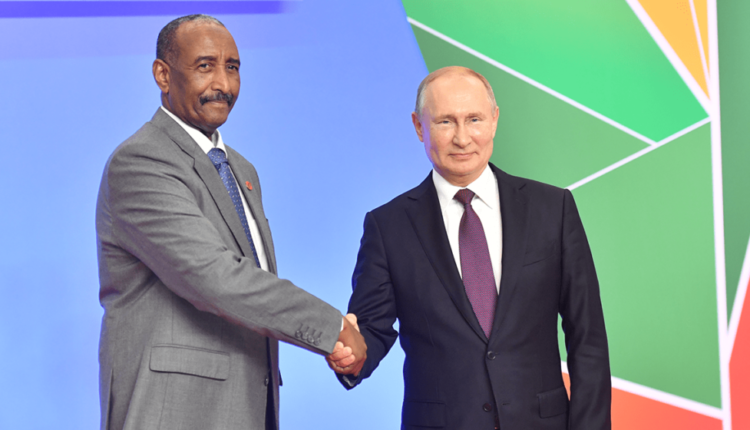Moscow, does it Look Like Khartoum’s Economic Strategic Partner?

Sudanhorizon – Nazik Shammam
The idea of Sudanese-Russian rapprochement, in its eco-political aspects, raises concerns at the regional and international levels regarding the alliances between countries in competition over economic interests in Africa’s abundant resources, a matter that makes each country eager to gain benefits as much as possible. Therefore, the idea of any giant country approaching one of the continent’s countries of weight is viewed with suspicion, raising fears and ambitions altogether!!
Russia has been approaching Sudan for years, and in quick steps, seeing it as its terminal to access other African countries. Since then, it has been engaging in gold and energy investment before and after the war.
Moscow has been Khartoum’s political ally in its diplomatic battle against the West, led by the United States of America, and it was still available in its current battle against the RSF Militia.
A delegation from the Russian Central Bank visited the Central Bank of Sudan as part of a Russian delegation that visited the administrative capital, Port Sudan, last week. That important visit aimed to discuss ways to develop and strengthen banking relations between Sudan and Russia and to open new horizons for cooperation between the two countries in the financial and banking fields, so the discussions focused on a set of promising opportunities for banking cooperation, including facilitating the entry into correspondent banking relations between their banks and opening branches in both countries, which will contribute in supporting trade exchange and increasing the volume of exports and imports between Sudan and Russia.
The discussions touched on the possibility of using local currencies to conduct bilateral trade transactions, reducing dependence on foreign currencies. The delegation also discussed opportunities for joint investment in vital sectors such as precious metals like gold and others, where the banks can play a pivotal role in financing these projects.
The two parties exchanged financial and banking experiences, stressing the importance of adopting the latest technologies to improve the efficiency and effectiveness of banking services provided to customers in both countries.
The visit of the high-level Russian banking delegation is an important step towards enhancing economic cooperation between Sudan and Russia. It opens the horizon to more strategic partnerships that will achieve sustainable development and enhance financial stability in both countries. The two sides expressed their aspiration to continue joint work and continuous coordination to achieve the goals of long-term banking cooperation in a way that serves the interests of the two countries and their peoples.
Russian economic rapprochement with Sudan at this critical stage of Sudan’s political life may seem like an idea that accepts right and wrong, and experts were not identic. Sudan needs urgent economic support to overcome the clutches of economic collapse due to the depletion of its resources exhausted by the war. Given that it has similar circumstances to Sudan in its war against Ukraine, does Russia seem to be the ideal partner for this support?
The economic expert Dr. Adel Abdel Aziz says, “Russia is considered an economic superpower, with a GDP of $4.027 trillion, and it ranks sixth internationally in terms of GDP value.
Adel pointed out that Sudan and Russia had previously signed many agreements and memoranda of understanding, the most prominent of which was in the field of technology for converting petroleum gases into liquid petroleum materials, which is a unique Russian technology that could represent an important addition to Sudanese oil production. Then, there was an agreement in the field of prospecting for gold and other minerals and another agreement on aerial mapping on land and at sea.
In his interview with the “Almohagig” news website, Abdelaziz demanded that Russia provide Sudan with a commodity loan at this stage. This includes supplying Sudan with its needs of petroleum materials, wheat, flour, and fertilizers. The loan value will be repaid within ten to fifteen years, with a grace period of at least two years.
He pointed out that there is a golden opportunity to conclude a strategic alliance with the Russian Federation at present. Still, Abdelaziz warned at the same time of the importance of paying attention to trade with Russia, especially since the volume of trade exchange with Russia does not currently exceed $110 million per year, while Russian exports abroad amount to $640 billion.
In turn, the economic analyst, Dr. Haitham Mohamed Fathi, said that Sudan’s cooperation with Russia would have great positive returns on the Sudanese economy, indicating that Sudan can benefit from Russian expertise in many vital economic fields and sectors such as agriculture, livestock, mining, leather products, oil, in addition to railways, dams and electricity, especially since the Russian investment companies’ is tiny. Most of them are confined to the mining sector.
He pointed out that Russia, in addition to having the largest direct investment fund, also has enormous accumulated expertise in wheat cultivation and is considered one of the largest wheat exporters in the world due to its modern technology in this field.
Fathi revealed in his interview with “Sudanhorizon” that the current volume of trade exchange between Sudan and Russia did not exceed $500 million at its best and stressed the need to combine efforts through joint work to increase the volume of trade exchange between the two countries, as it is very modest compared to the size of the Russian economy, indicating that Sudanese-Russian relations enjoy an extended historical character, which makes them among the most robust relations, as all economic, technical, technological and military activities were distinguished by a vital advantage and factor that was not available in most of Sudan’s relations with the outside world.
Shortlink: https://sudanhorizon.com/?p=1162

